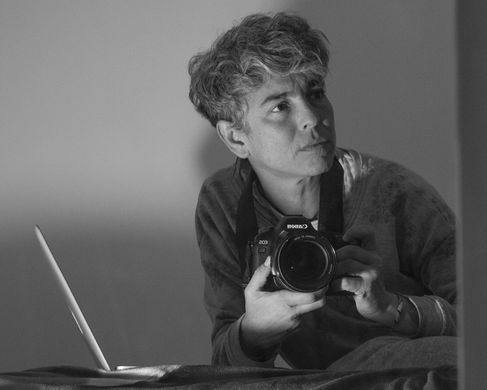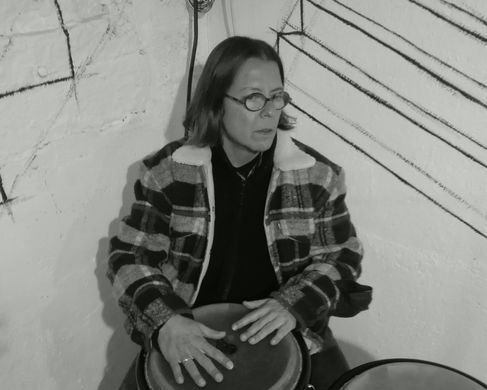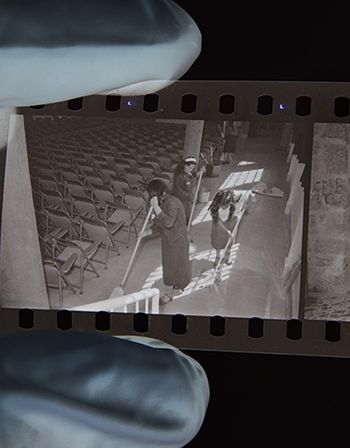Ángela Bonadies / Brígida Maestres
THE UN-SCENE: Capturing the Absence by Wandering
31. 7. – 12. 8. 23
What are the blind spots of an image? Guided by this question, this course is an invitation to create photographic essays or ‘field diaries’ based on the paradox between absence and presence, viewing photography as an expanded medium, as a political artifact nurtured by other fields such as autobiography and by invisible resources and strategies.
We will share audio-visual and textual references and perform listening, observation and writing exercises during group walks and wanderings around the city. This will lead students to conceive projects by connecting images with their underlying and invisible purposes: the self, the body, the artifact, the context.
Participants will improve their expressive and reflective skills, enhance the poetics of their projects, and use digital and pinhole cameras (darkroom available) to work with different materialities and temporalities. They will develop projects from beginning to end and put diverse forms of presentation in practice.
key data
- Venue
- Festung Hohensalzburg
- Date
- 31. 7. – 12. 8. 23
Ángela Bonadies
Ángela Bonadies' photographic practice focuses on memory, archive, and the visibility and invisibility of cultural structures and urban space. Her work moves between straight photography and digital montage to ask from a critical perspective how the medium produces meaning.
Teaching experience
2012 De la autoconstrucción a las comunidades cerradas with Antoni Muntadas and Juan José Olavarría, Universidad Central de Venezuela, Caracas
2014 Proyecto Inverso, Universidad Central de Venezuela, Caracas
2015-2016 Estructuras de excepción, Arts Santa Mònica-Homesession, Barcelona (ES)
2017 Zona Intermedia, Fabra i Coats, Barcelona (ES)
2018 Abecedari Ciutat Vella, La Negreta, Barcelona (ES)
Exhibitions
Solo Exhibitions
2022 En las entrañas de la bestia, La Virreina Centre de la Imatge, Barcelona (ES). 2019 La Pesca, Galería Freijo, Madrid. 2016 West Side, Abra, Caracas
Group Exhibitions
2021 Premi Ciutat de Palma 2020, Casal Solleric, Mallorca (ES). 2020 Archivos, registros necesarios, Universidad del País Vasco, Bizkaia Aretoa-UPV/EHU, Bilbao (ES). De confines y confinamientos, Bienal de Cuenca (EC). 2019 La radice del domani, Real Academia de Bellas Artes de San Fernando, Madrid. Cruzando la línea, 45 Salón de Arte, Cinemateca Distrital de Bogotá, Bogotá. Mostra de Processos, Art Investigation Programme, Casa Planas, Mallorca. 2018 Casa Tomada, Santa Fe SITELines 2018 Biennial: New Perspectives on Art of the Americas, Santa Fe, NM (US). The Matter of Photography in the Americas, Cantor Arts Center at Stanford University, Stanford, CA (US). 2017 A Universal History of Infamy, Los Angeles County Museum of Art (LACMA), CA (US). A Universal History of Infamy: Virtues of Disparity, 18th Street Arts Center, Santa Monica, CA (US). 2016 Magical (un) Real: Entranced Land, Momenta Art, Brooklyn, New York, NY (US). El tormento y el éxtasis, Es Baluard Museu d'art modern i contemporani de Palma, Mallorca. 2015 Die Bestie und ist der Souverän, Württembergischer Kunstverein Stuttgart (WKV), Stuttgart (DE). La Bestia y el Soberano, Museu d’Art Contemporani de Barcelona (MACBA). Translocacions, Centre d'Art Santa Mònica, Barcelona. 2014 The white elephant with Susan Winterling and Juan José Olavarría, After-the Butcher, Berlin. 2013 Global Activism, Zentrum für Kunst und Medientechnologie (ZKM), Karlsruhe (DE). Mano segura no se tranca / The safe hand does not...? Present Company, Brooklyn, New York, NY. Sextanisqatsi: desorden habitable, Antiguo Colegio de San Ildefonso, Mexico City. Ex-culturas, Periférico Caracas Arte Contemporáneo, Caracas. 2012 Devir Menor: Arquiteturas e Práticas Espaciais Críticas na Ibero-América, Sociedade Martins Sarmento, Guimarães (PT). Medios y Ambientes, Museo Universitario del Chopo, Mexico City. Sextanisqatsi: desorden habitable, Museo de Arte Contemporáneo de Monterrey (MARCO), Monterrey (MX)
Publications
Manuel Vásquez-Ortega, Ángela Bonadies: metadocumento y archivo de una modernidad venezolana, 2020
Hans D. Christ, Iris Dressler, Paul B. Preciado, Valentín Roma (eds.), The Beast and the Sovereign. Spector Books, Leipzig, 2018
José Luis Blondet, Rita González, Pilar Tompkins Rivas and Jennifer Cernada (eds.), A Universal History of Infamy. Los Angeles County Museum of Art and BOM DIA BOA TARDE BOA NOITE, Berlin, 2018
Jeny Amaya, Betty Marín, What Can Archives Reveal? A Fascinating Look Inside Mexican Prison Records and Scientific Files, 2016
Peter Weibel (ed.), Global Activism. Art and Conflict in the 21st Century. MIT Press, Cambridge, 2015

Brígida Maestres
Brígida Maestres’s projective interest in the vision of political systems has gradually led her to researching her own vision experience – a project carried by her existence as a person diagnosed with low vision, reluctance to normative wording and other captures of biopolitics related to disability/impairment. Her practice includes fictional narrative and music (expressive percussion performance) as a potent methodology for dismantling dominant discourses and building a sensorium reality. Her transformative process has influenced both her use of scholarly language and her pedagogical practice as a professor.
Education
2016 Social Psychology, Universitat Autònoma de Barcelona, Barcelona (ES), PhD
1996 Sociology, Universidad central de Venezuela, Caracas, BA
Teaching Experience
2004 – present, Social Psychology and Social Science, Universitat Oberta de Catalunya, Barcelona (ES), Professor
Publications
Brígida Maestre, “Excurso: Eulàlia Massat, vindicante. ¡Ni tuerta, ni discapacitada: Vulnerable!”, in: Asun Pié, Jordi Planella (eds.), Corpografías de la discapacidad. ¿Puede la pedagogía escapar del cuerpo?, Lugar Editorial, Buenos Aires 2021
Brígida Maestre, “La soledad de las marionetas. Delirio pedagógico (epistolar) sobre las tiranías del nombre”, in: Asun Pié (ed.), Escenas de Educación Social II, UOC, Barcelona (ES), 2019

